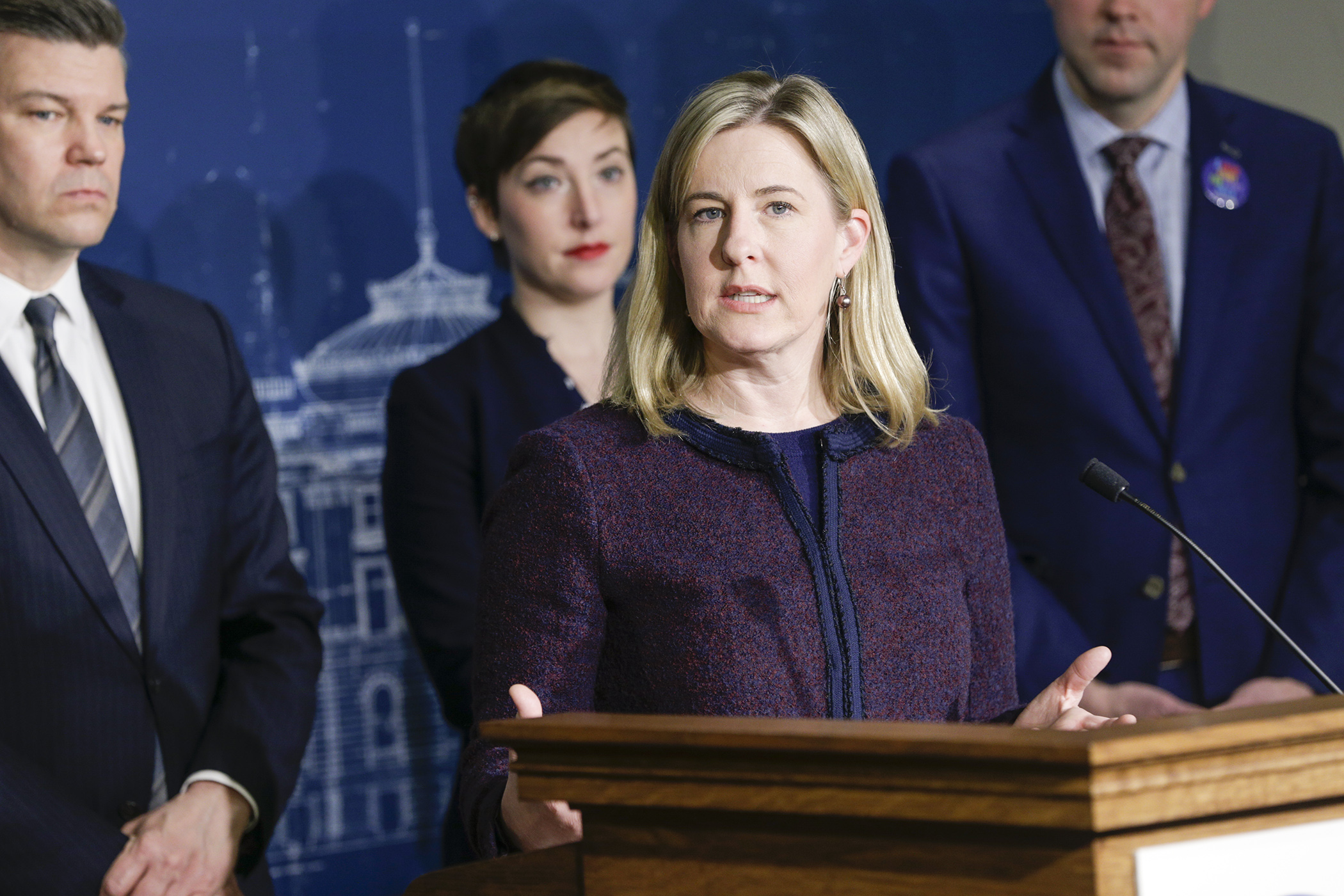DFL leaders preview priorities for upcoming session

Early childhood learning, insulin affordability, paid family and medical leave, gun violence prevention and bonding are issues House DFL leaders intend to be the focus of their agenda when the 2020 legislative session begins Feb. 11.
House Speaker Melissa Hortman (DFL-Brooklyn Park) on Thursday outlined her party’s priorities for the upcoming session, saying the DFL would continue working on many of the same issues it tackled in 2019.
“Minnesotans’ values and the values that guide us haven’t changed,” Hortman said at a press briefing. “Minnesotans have told us they want a Minnesota that works better for everyone. They want world class schools, affordable and accessible health care, economic security for their families and safe and inclusive communities.”
Hortman was accompanied by House Majority Leader Ryan Winkler (DFL-Golden Valley) and several DFL members who chair or serve on the committees and divisions that will be tasked with debating and acting on those issues.
Hortman promised a “very ambitious proposal” on early childhood learning that Rep. Carlie Kotyza-Witthuhn (DFL-Eden Prairie) said would include a broad spectrum of investments “very similar” to HF1, which she sponsored in 2019.
Rep. Dave Pinto (DFL-St. Paul), who chairs the House Early Childhood Finance and Policy Division, said early learning scholarships targeted at kids who are newborns to age 3, child care assistance for low-income families and support for child care providers will be included.
“This is a huge need all around the state in terms of child care and early learning,” Pinto said. “Each of these are provisions that we expect will find a lot of support in the Republican [controlled] Senate.”
Hortman also said she would support the largest “responsible” bonding bill the state could afford while still maintaining its AAA bond rating.
Gov. Tim Walz has proposed a bonding package of more than $2 billion citing a record number of requests for assistance from around the state and favorable economic conditions that he says makes 2020 the time to act on many of them.
His “Local Jobs and Projects Plan” includes:
- $673 million – public safety and asset preservation;
- $536 million – quality of life;
- $447 million – higher education;
- $293 million – water quality and infrastructure; and
- $276 million – safe and affordable housing.
Rep. Mary Murphy (DFL-Hermantown), who chairs the House Capital Investment Division, has said she favors a considerably larger bonding bill, perhaps approaching $3.5 billion, and Rep. Fue Lee (DFL-Mpls), the division’s vice-chair, said Minnesota Management and Budget has told them the state has the capacity for a bill of that size. But Hortman said the House will not arrive at a final bonding number until after MMB’s February Forecast is released.
Some other legislative priorities Hortman discussed included:
- Insulin affordability: “Democrats have come forward, towards the Republican position and we have acknowledged that the state taxpayers will pay some of the expenses, even though they’re not the ones who created the problem. Now it’s time for the Republicans to take a step in our direction and acknowledge that the pharmaceutical companies have to put some money on the line.”
- Gun violence prevention: “Everybody who wants to purchase a firearm should have a criminal background check and we need to make sure guns are not in the hands of people who shouldn’t have them, when they shouldn’t have them.”
- Climate change: “Last year we passed a 100% clean energy standard. We will continue to be very active in the climate space.”
Senate Majority Leader Paul Gazelka (R-Nisswa) issued a statement in response to the DFL press conference, stressing the need for cooperation.
“Where we agree, Senate Republicans will move bills forward,” Gazelka said. “Minnesotans want government to work well and with bipartisan cooperation. That doesn’t include spending every penny of the surplus, borrowing to the brink, or massive new programs like mandatory paid leave. We’ll push our priorities, and so will others, but ultimately if there isn’t broad bipartisan agreement, it’s not going to successful this session.”
Related Articles
Search Session Daily
Advanced Search OptionsPriority Dailies
Ways and Means Committee OKs proposed $512 million supplemental budget on party-line vote
By Mike Cook Meeting more needs or fiscal irresponsibility is one way to sum up the differences among the two parties on a supplemental spending package a year after a $72 billion state budg...
Meeting more needs or fiscal irresponsibility is one way to sum up the differences among the two parties on a supplemental spending package a year after a $72 billion state budg...
Minnesota’s projected budget surplus balloons to $3.7 billion, but fiscal pressure still looms
By Rob Hubbard Just as Minnesota has experienced a warmer winter than usual, so has the state’s budget outlook warmed over the past few months.
On Thursday, Minnesota Management and Budget...
Just as Minnesota has experienced a warmer winter than usual, so has the state’s budget outlook warmed over the past few months.
On Thursday, Minnesota Management and Budget...